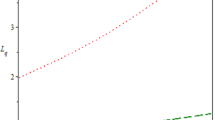Abstract
The thought to put forward a queuing model proposed in this work was its pertinence in everyday life wherever we can see the uses of computing and networking systems. Industrial software developers and system managers can consider the results of the model to evolve their system for better results. Here we present a novel queueing model having erratic server with delayed repair and balking. Two distinct breakdowns i.e. active and passive breakdown for the system are also considered with their respective amendments. This model is closely related with the smooth functioning of the system during some internal faults (virus attack, electricity failures etc.). The performance indicators which are utilized in enhancing the service standards are obtained using supplementary variable technique. Using ANFIS soft computing technique we have compared the analytical results with those of neuro fuzzy results. Furthermore single and bi-objective minimization problems are considered and minima is obtained using particle swarm optimization and multi objective genetic algorithm respectively. Also, the minimization problems are shown as a convex programming problem to ensure the global optimality of the result. The proposed approach makes it conceivable to accomplish a relevant harmony between operational expenses and administration quality.









Similar content being viewed by others
References
Bazaraa, M., Sherali, H., & Shetty, C. M. (2005). Nonlinear Programming—Theory and Algorithms (3rd ed.). Wiley.
Choudhury, G., & Tadj, L. (2009). An M/G/1 queue with two phases of service subject to the server breakdown and delayed repair. Applied Mathematical Modelling, 33(6), 2699–2709. https://doi.org/10.1016/j.apm.2008.08.006
Dragieva, V. I., & Phung-Duc, T. (2020). A finite-source M/G/1 retrial queue with outgoing calls. Annals of Operations Research, 293, 101–121. https://doi.org/10.1007/s10479-019-03359-z
Gao, S., Zhang, J., & Wang, X. (2020). Analysis of a retrial queue with two-type breakdowns and delayed repairs. IEEE Access, 8, 172428–172442. https://doi.org/10.1109/ACCESS.2020.3023191
Gomes Corral, A. (1999). Stochastic analysis of a single server retrial queue with general retrial times. Naval Research Logistics, 46(5), 561–581.
Jin-ting, W. (2006). Reliability analysis of M/G/1 queues with general retrial times and server breakdowns. Progress in Natural Science: Materials International, 16(5), 464–473. https://doi.org/10.1080/10020070612330021
Kahag, M. R., Niaki, S. T. A., Seifbarghy, M., & Zabihi, S. (2019). Bi-objective optimization of multi-server intermodal hub-location allocation problem in congested systems: modeling and solution. Journal of Industrial Engineering International, 15(2), 221–248. https://doi.org/10.1007/s40092-018-0288-0
Kennedy, J., & Eberhart R. (1995). Particle swarm optimization. In Proceedings of ICNN’95-international conference on neural networks (Vol. 4, pp. 1942–1948). IEEE, Perth, Australia.
Kim, J., & Kim, B. (2016). A survey of retrial queueing systems. Annals of Operations Research, 247, 3–36. https://doi.org/10.1007/s10479-015-2038-7
Lan, S., & Tang, Y. (2020). An unreliable discrete-time retrial queue with probabilistic preemptive priority, balking customers and replacements of repair times. AIMS Mathematics, 5(5), 4322–4344. https://doi.org/10.3934/math.2020276
Lee, S. W., Kim, B., & Kim, J. (2020). Analysis of the waiting time distribution in M/G/1 retrial queues with two way communication. Annals of Operations Research, 310, 505–518. https://doi.org/10.1007/s10479-020-03717-2
Miettinen, K. (1998). Nonlinear Multiobjective Optimization. Kluwer Academic Publishers.
Mohammadi, M., Dehbari, S., & Vahdani, B. (2014). Design of a bi-objective reliable healthcare network with finite capacity queue under service covering uncertainty. Transportation Research Part E: Logistics and Transportation Review, 72, 15–41. https://doi.org/10.1016/j.tre.2014.10.001
Pourmohammadi, P., Tavakkoli-Moghaddam, R., Rahimi, Y., & Triki, C. (2021). Solving a hub location-routing problem with a queue system under social responsibility by a fuzzy meta-heuristic algorithm. Annals of Operations Research. https://doi.org/10.1007/s10479-021-04299-3
Saggou, H., Lachemot, T., & Ourbih-Tari, M. (2017). Performance measures of \(M/G/1\) retrial queues with recurrent customers, breakdowns, and general delays. Communications in Statistics - Theory and Methods, 46(16), 7998–8015. https://doi.org/10.1080/03610926.2016.1171352
Sherman, N. P., Kharoufeh, J. P., & Abramson, M. P. (2009). An M/G/1 retrial queue with unreliable server for streaming multimedia applications. Probability in the Engineering and Informational Sciences, 23(2), 281–304. https://doi.org/10.1017/S0269964809000175
Taleb, S., & Aissani, A. (2016). Preventive maintenance in an unreliable M/G/1 retrial queue with persistent and impatient customers. Annals of Operations Research, 247(1), 291–317. https://doi.org/10.1007/s10479-016-2217-1
Tavakkoli-Moghaddam, R., Vazifeh-Noshafagh, S., Taleizadeh, A. A., Hajipour, V., & Mahmoudi, A. (2017). Pricing and location decisions in multi-objective facility location problem with M/M/m/k queuing systems. Engineering Optimization, 49(1), 136–160. https://doi.org/10.1080/0305215X.2016.1163630
Upadhyaya, S. (2014). Performance analysis of a batch arrival retrial queue with Bernoulli feedback. International Journal of Mathematics in Operational Research, 6(6), 680–703. https://doi.org/10.1504/IJMOR.2014.065423
Upadhyaya, S., & Kushwaha, C. (2020). Performance prediction and ANFIS computing for unreliable retrial queue with delayed repair under modified vacation policy. International Journal of Mathematics in Operational Research, 17(4), 437–466. https://doi.org/10.1504/IJMOR.2020.110843
Verma, R. K. (1986). Multiobjective optimization of a queueing system. Optimization, 17(1), 103–115. https://doi.org/10.1080/02331938608843107
Wu, C. H., & Yang, D. Y. (2021). Bi-objective optimization of a queueing model with two-phase heterogeneous service. Computers & Operations Research. https://doi.org/10.1016/j.cor.2021.105230
Zhang, Z. G. (2006). On the convexity of the two-threshold policy for an M/G/1 queue with vacations. Operations Research Letters, 34(4), 473–476. https://doi.org/10.1016/j.orl.2005.07.002
Zhang, Z. G., Vickson, & Eenige, M. J. A. (1997). Optimal two-threshold policies in an M/G/ 1 queue with two vacation types. Performance Evaluation, 29(1), 63–80. https://doi.org/10.1016/S0166-5316(96)00005-3
Acknowledgements
The authors of the paper are thankful for the insightful and valuable comments of the anonymous referees as their suggestions helped in shaping our paper for the better.
Author information
Authors and Affiliations
Corresponding author
Additional information
Publisher's Note
Springer Nature remains neutral with regard to jurisdictional claims in published maps and institutional affiliations.
Rights and permissions
Springer Nature or its licensor holds exclusive rights to this article under a publishing agreement with the author(s) or other rightsholder(s); author self-archiving of the accepted manuscript version of this article is solely governed by the terms of such publishing agreement and applicable law.
About this article
Cite this article
Agarwal, R., Agarwal, D., Upadhyaya, S. et al. Optimization of a stochastic model having erratic server with immediate or delayed repair. Ann Oper Res 331, 605–628 (2023). https://doi.org/10.1007/s10479-022-04804-2
Accepted:
Published:
Issue Date:
DOI: https://doi.org/10.1007/s10479-022-04804-2




